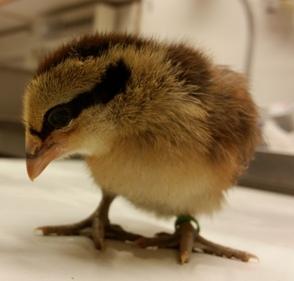Summary

The cognitive process of gathering, processing and storing information in animals can include biases. Cognitive judgment bias is one type of cognitive bias. This bias can be positive or negative, resulting in more optimistic or pessimistic interpretation of stimuli. Such optimism or pessimism can be tested when observing responses to ambiguous cues intermediate of cues with known positive and negative values. Cognitive judgment bias tests are commonly used to assess animal welfare, here I instead investigate what influences cognitive judgment bias.
As a first experiment I investigated how two different environmental factors affect the cognitive judgment bias of laying hen chicks. I therefore trained chicks housed in different environments to associate one colour cue with a reward, and another colour cue with a lack of reward, before observing their reactions to three intermediate, ambiguous, cues. Laying hen chicks were exposed to stress and/or environmental enrichment, and then tested before and after a collective stressor. I show that environmental enrichment can buffer stress in chicks, as the initial stress never has an effect over the chicks reaction and enrichment only has an effect after the collective stressor.
Because individual differences are observed in animals exposed to equal conditions I then investigated if variation in personality (i.e. consistent individual differences in behaviour) influence cognitive judgment bias in red junglefowl chicks. Red junglefowl chicks were then housed in equal environments and exposed to three personality tests in addition to a cognitive judgment bias test. It was then demonstrated that personality has a limited influence over interpretation of ambiguous stimuli, where less nervous chicks are more optimistic towards ambiguous and negative cues.
It is therefore concluded that environmental enrichment can buffer the influence of stress on cognitive judgment bias and that personality has a small but significant influence over interpretations of ambiguous stimuli. In the future experiments in this field should focus on exploring more aspects in how cognitive judgment bias occurs to understand the complex minds of animals and humans.
Responsible for this page:
Director of undergraduate studies Biology
Last updated:
06/16/15
